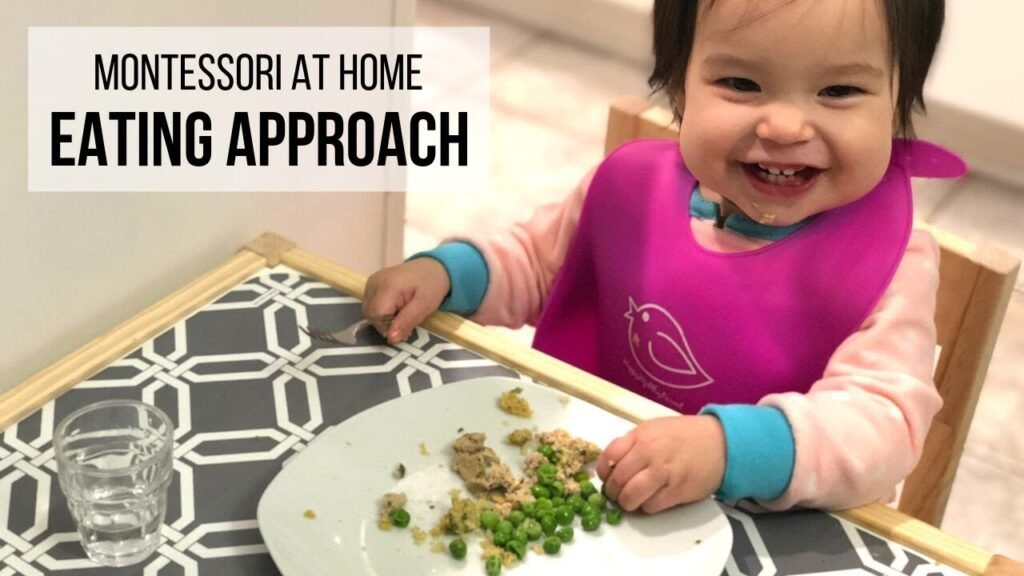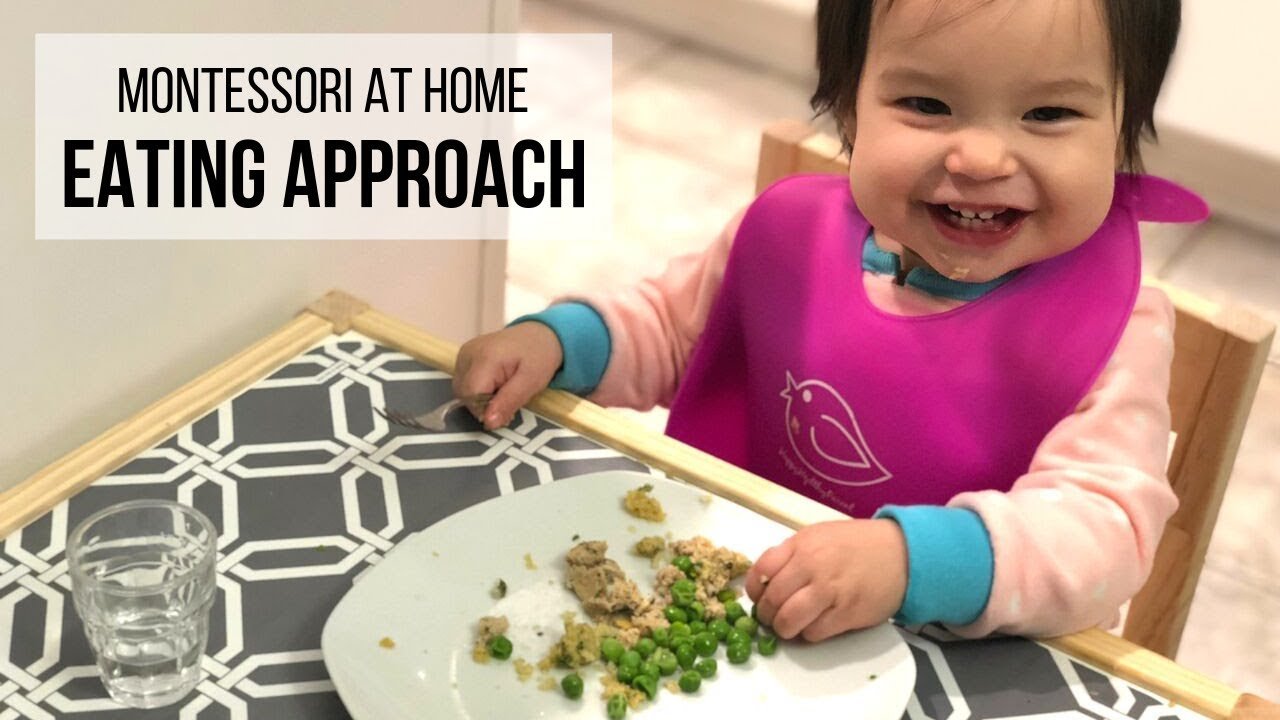Hi there! The Montessori at Home series is here to provide you with practical tips on Montessori parenting, specifically focusing on the approach to eating for babies and toddlers. In this video by Hapa Family, no sponsorships are involved, but some links in the description may be affiliate links. The main goal is to guide you through the Montessori approach to eating, emphasizing the child, the adult, and the environment. It’s recommended to use a weaning table and child-sized cutlery, while baby-led weaning encourages independence through finger foods. As a parent, your role is to provide healthy options and set meal times, allowing your child to choose what and how much to eat.
Hey, it’s Ashley! As a mom of two girls, Kylie and Mia, I’m passionate about sharing my Montessori parenting journey with you. Eating in a Montessori home can be a stress-free experience, focusing on the child, the adult, and the environment. By following the principles of Montessori parenting, you can create a positive and empowering mealtime experience for your little ones. From introducing a weaning table to using real glass cups and dinnerware, you can set the stage for healthy eating habits and independence in your children. Remember, the Montessori at Home series is here to support busy parents looking to incorporate Montessori principles into their parenting style.

Overview of Montessori Parenting
Montessori parenting is an approach based on the teachings of Maria Montessori, emphasizing independence, respect, and freedom within limits for children. This method believes in treating children with dignity, allowing them to explore and learn at their own pace while providing a structured environment. Understanding the Montessori approach to parenting is essential for creating a nurturing and supportive atmosphere for children to thrive in.
Understanding the Montessori Approach to Parenting
The Montessori approach to parenting focuses on giving children the freedom to make choices within a structured environment. It promotes independence, respect for the child’s individuality, and encourages hands-on learning. By creating a prepared environment and following specific principles, parents can support their child’s growth and development effectively.
Key Principles of Montessori Parenting
Some key principles of Montessori parenting include fostering independence, promoting natural development, encouraging respect for the child, and allowing freedom within limits. By implementing these principles, parents can create a positive and nurturing environment for their children to learn and grow.
Benefits of Montessori Parenting
Montessori parenting offers numerous benefits, including fostering independence and self-confidence in children, promoting a love for learning, and developing a sense of responsibility. By following the Montessori approach, parents can cultivate a respectful and harmonious relationship with their children while supporting their overall development.
Montessori Approach to Eating
The Montessori approach to eating focuses on promoting independence, respect for the child, and creating a supportive environment for mealtime. By incorporating specific strategies and tools, parents can encourage healthy eating habits and instill a sense of autonomy in their children.
Focus on Child, Adult, and Environment
In the Montessori approach to eating, there is a strong emphasis on preparing the environment, the adult (parent), and the child for mealtime. By setting up a conducive environment, using appropriate tools, and establishing routines, parents can create a positive eating experience for their children.
Use of Weaning Table and Child-Sized Cutlery
One key aspect of the Montessori approach to eating is the use of a weaning table and child-sized cutlery. These tools are designed to promote independence and allow children to actively participate in mealtime. By providing child-appropriate utensils and furniture, parents can empower their children to feed themselves and develop essential motor skills.
Baby-Led Weaning Approach
Montessori parenting often advocates for a baby-led weaning approach, where children are encouraged to explore and engage with food independently. This method skips purees and focuses on offering a variety of finger foods to enable children to self-feed and develop a positive relationship with food.
Practical Tips for Mealtime
Ensuring a successful mealtime experience involves providing healthy options, setting meal times, and allowing children to make decisions about what and how much they eat. By following these practical tips, parents can create a positive eating environment and encourage healthy eating habits in their children.
Provide Healthy Options
Offering a variety of nutritious foods is essential for promoting healthy eating habits in children. By providing balanced meals and snacks, parents can ensure that their children receive the necessary nutrients for growth and development.
Set Meal Times
Establishing regular meal times helps create a sense of routine and structure for children. By sticking to consistent meal schedules, parents can help their children develop healthy eating habits and regulate their appetites.
Allow Child to Decide What and How Much to Eat
Giving children the freedom to choose what and how much they eat promotes independence and autonomy. By allowing children to listen to their hunger cues and make decisions about their meals, parents can empower them to develop a positive relationship with food.
Recommended Mealtime Tools
Incorporating specific mealtime tools can enhance the Montessori approach to eating and promote independence in children. By using real glass cups, child-friendly dinnerware, and safe utensils, parents can support their children’s development and encourage self-sufficiency at mealtime.
Real Glass Cups
Introducing children to drinking from real glass cups helps promote independence and self-reliance. By using durable tempered glass cups, parents can teach children valuable lessons about taking care of their belongings and handling items with care.
Child-Friendly Dinnerware
Providing children with age-appropriate dinnerware encourages them to participate in mealtime activities. Using small ceramic plates and bowls allows children to feel included and independent while promoting a sense of responsibility.
Safe Utensils for Children
Using safe and practical utensils for children, such as toddler-sized silverware, empowers children to feed themselves and develop fine motor skills. By opting for utensils with metal tips and easy-to-grip handles, parents can support their children’s self-feeding abilities and promote independence.
Introduction to Montessori at Home Series
The Montessori at Home series, created by Ashley, a devoted mom of two girls, focuses on practical tips and strategies for busy parents interested in Montessori parenting. With a specific emphasis on eating in a Montessori home, this series offers valuable insights and recommendations for creating a nurturing and supportive environment for children.
Creator is Ashley, a Mom of Two Girls
Ashley, a passionate advocate for Montessori parenting, shares her personal experiences and expertise in creating a Montessori-inspired home environment for her two daughters, Kylie and Mia. Through the Montessori at Home series, Ashley provides valuable insights and practical tips for parents looking to incorporate Montessori principles into their daily routines.
Passionate About Montessori Parenting
Ashley’s dedication to Montessori parenting shines through in her approach to creating a child-centered and empowering environment for her children. By sharing her knowledge and experiences, Ashley hopes to inspire other parents to embrace the principles of Montessori parenting and foster a loving and respectful relationship with their children.
Focus on Eating in a Montessori Home
With a specific focus on eating in a Montessori home, the Montessori at Home series explores strategies and tools for promoting independence, healthy eating habits, and positive mealtime experiences for children. By emphasizing the importance of creating a supportive eating environment, Ashley provides practical guidance for parents seeking to implement Montessori principles at home.
Content of Montessori at Home Series
The Montessori at Home series offers practical tips, specific guidance, and a wealth of information for busy parents interested in Montessori parenting. With a particular focus on eating in a Montessori home, this series addresses common challenges and provides actionable advice for creating a harmonious and nurturing environment for children.
Practical Tips for Busy Parents
The Montessori at Home series provides practical tips and strategies for busy parents seeking to incorporate Montessori principles into their daily routines. By offering actionable advice and step-by-step guidance, this series empowers parents to create a supportive and enriching environment for their children.
Specific Focus on Eating in a Montessori Home
With a dedicated focus on eating in a Montessori home, the Montessori at Home series explores the importance of mealtime routines, tools, and strategies for promoting independence and healthy eating habits in children. By addressing common challenges and offering practical solutions, this series equips parents with the knowledge and resources to create a positive eating environment for their children.
No Sponsorships Involved in the Content
The Montessori at Home series is created with a genuine commitment to providing valuable and unbiased content for parents. Without any sponsorships or external influences, Ashley’s focus remains solely on sharing her expertise and experiences in Montessori parenting to support and empower other parents on their journey.
Affiliate Links Disclaimer
Some links included in the description of the Montessori at Home series may be affiliate links. If a product is purchased through these provided links, a commission may be received by Ashley. It is important to note that there is no additional charge to the consumer, and the commission helps support Ashley in creating and providing free content each week for her audience.
Creator’s Background
Ashley, a devoted mom of two girls, Kylie and Mia, is deeply passionate about Montessori parenting, especially when it comes to eating in a Montessori home. With a wealth of personal experiences and a genuine commitment to empowering parents, Ashley shares her knowledge and expertise through the Montessori at Home series. By drawing on her own journey as a Montessori parent, Ashley offers valuable insights and practical guidance for parents looking to create a nurturing and supportive environment for their children.
Conclusion
The Montessori at Home series offers a wealth of practical tips and valuable insights for busy parents interested in Montessori parenting. By emphasizing a child-centered approach to eating and mealtime, Ashley provides actionable advice and recommendations for creating a harmonious and enriching environment for children. Through her dedication to Montessori principles, Ashley inspires parents to foster independence, respect, and a love for learning in their children while cultivating a positive and supportive relationship at home.

